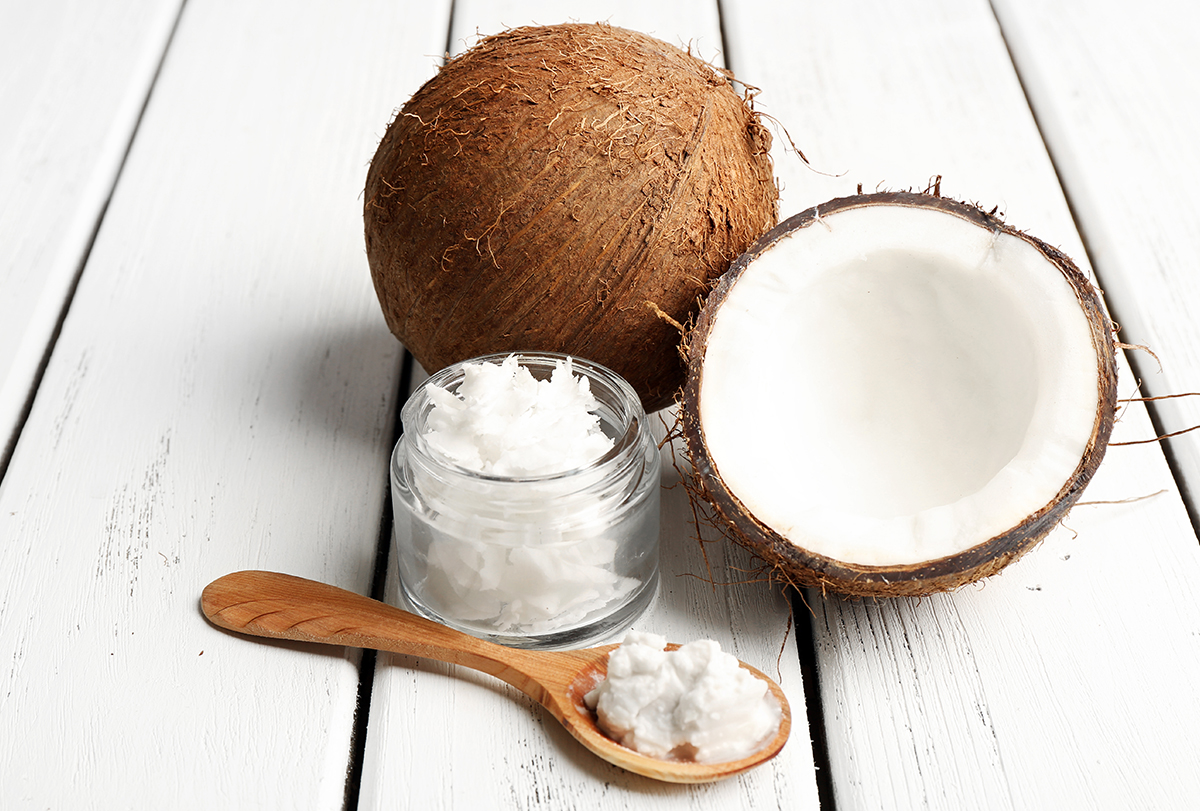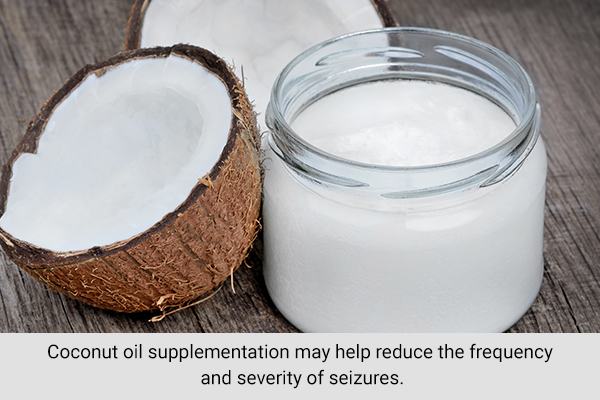In this article:
Coconut oil is almost entirely made up of saturated fatty acids (92%), (1) which are known to increase bad cholesterol and pave the way for heart disease. This is why it was considered unhealthy for the longest time.

However, recent research has highlighted some of the beneficial aspects of this oil that got overlooked due to its fatty acid composition, provided it is consumed in limited quantities. (2)
The fats in this oil largely fall under the category of medium-chain triglycerides and monoglycerides, with lauric acid being the most abundant one.
These medium-chain fatty acids are metabolized more easily by the body than long-chain ones that are found in most other foods. Plus, they are credited with antimicrobial, anti-inflammatory, antioxidant, antidiabetic, immune-boosting, antidiabetic, cancer-fighting, and hydrating properties. (3)(4)
Home Remedies Using Coconut Oil
Here are some easy ways the intake of coconut can benefit your health.
Note: It’s best to use organic, cold-pressed, virgin coconut oil for these remedies as it has maximum nutrient value and minimal adulteration.
1. Improves glycemic control
Coconut oil is known to improve insulin sensitivity, which allows your body to process and store glucose properly. Thus, coconut oil intake is recommended in controlled amounts.
There is some evidence to support the antiglycemic effects of coconut oil, but more extensive human studies are needed before this dietary intervention can be popularized as a means for diabetes management. (5)(6)
Plus, people with diabetes are more susceptible to cardiovascular diseases, and coconut oil only adds to that risk due to its high saturated fat content, which is known to increase bad cholesterol.
Note: If you have diabetes or prediabetes, consult your doctor before adding coconut oil to your daily diet.
How to use:
Consume 2–3 teaspoons of coconut oil every day, either directly or by using it in your cooking.
2. Supports oral health

The lauric acid in coconut oil can be good for your oral health. It dissolves the plaque inside the mouth to prevent it from sticking to the dental and gingival surfaces.
Not just that, lauric acid also exhibits antimicrobial and anti-inflammatory effects that inhibit the further buildup of plaque, thereby reducing the risk of dental caries and gum infections. (7)
The best way to reap this benefit is through oil pulling. This procedure involves taking a measured amount of coconut oil and thoroughly swishing it all around your mouth and between your teeth for 15–20 minutes.
However, there is limited evidence to show that the deep-cleansing effect provided by oil pulling can help improve oral hygiene. (7) More extensive and high-quality studies are needed to conclusively back this claim. (8)
How to use:
- Put a tablespoon of extra-virgin coconut oil in your mouth and vigorously swish it around for 15–20 minutes.
- Once you are done swishing, spit it out. Do not gargle or ingest the oil.
- Brush your teeth.
- Do this every morning before your first meal.
3. Aids digestion
Coconut oil is credited with digestive benefits. It contains saturated fats that help soothe the inner lining of the gastrointestinal tract due to their anti-inflammatory properties.
Thus, adding this ingredient to your diet may help facilitate smooth digestion while also relieving acidity, irritable bowel syndrome, and other gastric problems.
The lauric acid and other saturated fats in coconut oil also exhibit antimicrobial properties that help fight various bacterial, fungal, and parasitic infections responsible for indigestion.
Lastly, coconut oil is known to improve nutrient absorption from foods. (9)
How to use:
- Mix ½ teaspoon of coconut oil in warm water, a healthy juice/smoothie, or your morning oatmeal.
- You can also use coconut oil in your daily cooking.
4. Reduces seizures

The ketogenic diet (KD), which runs high on fat and low on carbs with measured protein content, is a well-established intervention for managing childhood epilepsy. Coconut oil is rich in fats and contains minimal carbs, making it a good fit for this eating plan.
It is suggested that coconut oil supplementation may help reduce the frequency and severity of seizures. This therapeutic effect can be attributed mainly to the medium-chain triglycerides present in this oil. (10)(11)
How to use:
Consume 1 teaspoon of extra-virgin coconut oil thrice a day. Slowly increase the dose to up to 2 tablespoons a day.
5. Treats eczema
Eczema is an inflammatory disorder that makes your skin extremely dry, itchy, and irritated. Using coconut oil as a moisturizer may help reduce the severity of these symptoms. It contains high amounts of fat, making it deeply lubricating for your parched skin.
Plus, coconut oil forms a thick protective layer over the skin to block out irritants and prevent moisture loss. In fact, the hydrating effect of virgin coconut oil was comparable to mineral oil for relieving mild to moderate xerosis (skin dryness).
Moreover, coconut oil is replete with lauric acid, which works as an anti-inflammatory agent that soothes irritated skin and reduces eczema flare-ups. The antioxidants in this oil may help repair damaged skin.
Eczema makes your skin prone to tearing, which can pave the way for infections. Coconut oil can help in this regard as well. It is known to exhibit antimicrobial activity that can help protect your sensitive skin from germs. (12)
How to use:
- Gently massage some extra-virgin coconut oil over your eczema patches for a few minutes.
- Reapply 3–4 times daily, especially at night before going to bed.
6. Protects against Alzheimer’s disease

There is evidence that coconut consumption may positively impact some diseases. Alzheimer’s disease (AD) is a neurodegenerative disorder that gets progressively worse. It is quite common and is responsible for most cases of dementia in geriatric populations.
Alzheimer’s disease is said to be triggered by chronic inflammation and increased oxidative stress that builds up over time. This is why most of the preventive and treatment measures for this condition aim to reduce these factors to reduce the Alzheimer’s disease risk or its progression.
Scientists have studied the role of various dietary patterns as well as individual foods and nutrients in potentially reducing the onset, severity, and progression of AD. Preliminary investigations revealed that a diet rich in coconut oil significantly improved cognitive function in Alzheimer’s disease patients, particularly in women with mild to moderate Alzheimer’s disease.
However, these studies were quite small and need to be corroborated by larger clinical trials or cohort studies before coconut oil supplementation can be considered a legitimate means to control or prevent Alzheimer’s disease. (13)
How to use:
Consume 1–2 tablespoons of coconut oil every day.
Side Effects of Consuming Coconut Oil
The heavy dose of unhealthy saturated fats in coconut oil can harm your health when consumed in large quantities or as part of an unbalanced, nutritionally deficient diet.
Here are some commonly reported side effects that you need to be wary of:
- Saturated fats increase your calorie load and lead to undue weight gain when consumed in large quantities.
- Too much intake of saturated fats also increases cholesterol levels, which can wreak havoc on your cardiovascular health.
- Excessive consumption of coconut oil can also trigger intestinal issues.
- Coconut oil may cause allergic reactions in some individuals.
Final Word
Coconut oil can benefit your health in different ways, but only when consumed in recommended amounts. Moderation is key, especially since it is full of saturated fats that increase both calories and cholesterol levels.
However, the medium-chain triglycerides (MCTs) that make up most of this oil are metabolized faster than long-chain triglycerides, providing fuel to the body. Thus, although coconut oil may be calorie rich, these calories are easily processed by the body to release a lot of energy. (14) This along with the multiple other pharmacological effects mentioned in this article makes coconut oil a valuable addition to your diet.
However, always remember that no single ingredient can resolve your health issues; remedies can only help with their management. Plus, you must consume coconut oil as part of an overall healthy and well-balanced diet.
- Was this article helpful?
- YES, THANKS!NOT REALLY


